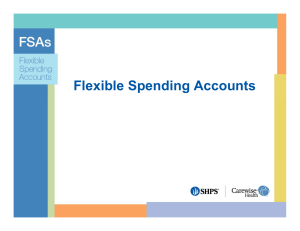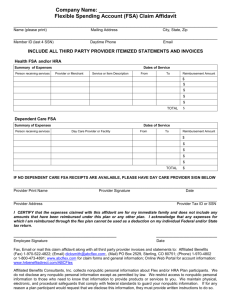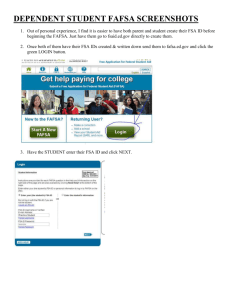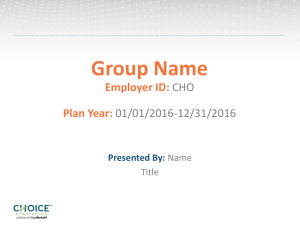Document 12855359
advertisement
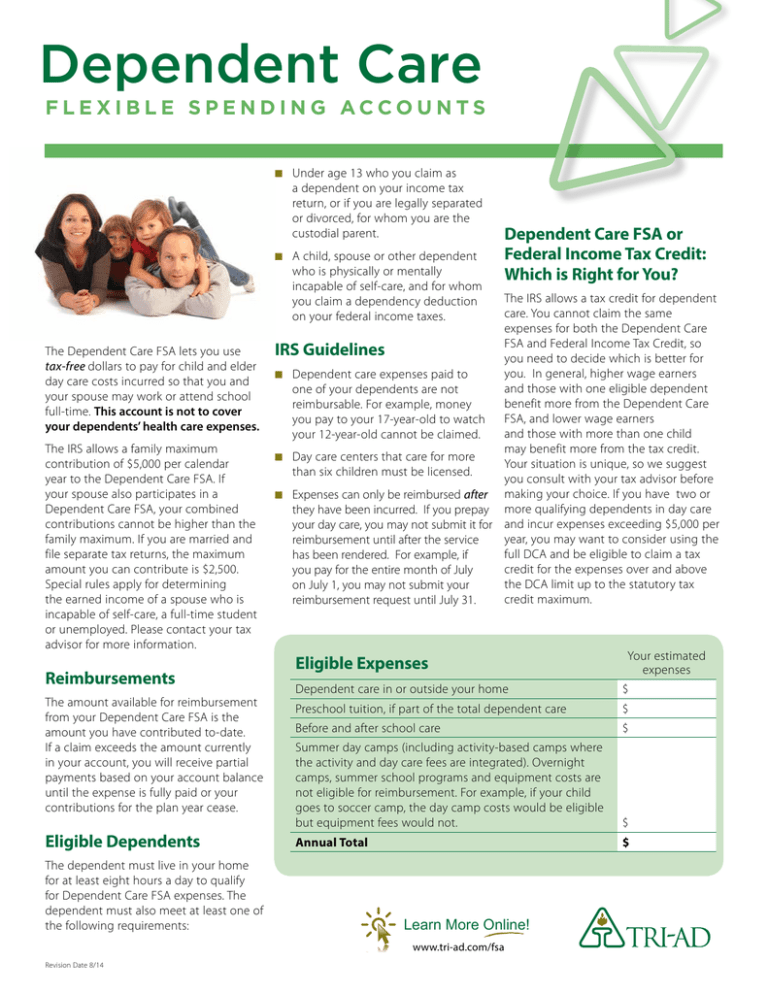
Dependent Care FLEXIBLE SPENDING ACCOUNTS n Under age 13 who you claim as a dependent on your income tax return, or if you are legally separated or divorced, for whom you are the custodial parent. n A child, spouse or other dependent who is physically or mentally incapable of self-care, and for whom you claim a dependency deduction on your federal income taxes. The Dependent Care FSA lets you use tax-free dollars to pay for child and elder day care costs incurred so that you and your spouse may work or attend school full-time. This account is not to cover your dependents’ health care expenses. The IRS allows a family maximum contribution of $5,000 per calendar year to the Dependent Care FSA. If your spouse also participates in a Dependent Care FSA, your combined contributions cannot be higher than the family maximum. If you are married and file separate tax returns, the maximum amount you can contribute is $2,500. Special rules apply for determining the earned income of a spouse who is incapable of self-care, a full-time student or unemployed. Please contact your tax advisor for more information. Reimbursements The amount available for reimbursement from your Dependent Care FSA is the amount you have contributed to-date. If a claim exceeds the amount currently in your account, you will receive partial payments based on your account balance until the expense is fully paid or your contributions for the plan year cease. Eligible Dependents The dependent must live in your home for at least eight hours a day to qualify for Dependent Care FSA expenses. The dependent must also meet at least one of the following requirements: The IRS allows a tax credit for dependent care. You cannot claim the same expenses for both the Dependent Care FSA and Federal Income Tax Credit, so IRS Guidelines you need to decide which is better for you. In general, higher wage earners n Dependent care expenses paid to and those with one eligible dependent one of your dependents are not benefit more from the Dependent Care reimbursable. For example, money FSA, and lower wage earners you pay to your 17-year-old to watch and those with more than one child your 12-year-old cannot be claimed. may benefit more from the tax credit. n Day care centers that care for more Your situation is unique, so we suggest than six children must be licensed. you consult with your tax advisor before n Expenses can only be reimbursed after making your choice. If you have two or they have been incurred. If you prepay more qualifying dependents in day care your day care, you may not submit it for and incur expenses exceeding $5,000 per year, you may want to consider using the reimbursement until after the service full DCA and be eligible to claim a tax has been rendered. For example, if credit for the expenses over and above you pay for the entire month of July the DCA limit up to the statutory tax on July 1, you may not submit your credit maximum. reimbursement request until July 31. Eligible Expenses Your estimated expenses Dependent care in or outside your home $ Preschool tuition, if part of the total dependent care $ Before and after school care $ Summer day camps (including activity-based camps where the activity and day care fees are integrated). Overnight camps, summer school programs and equipment costs are not eligible for reimbursement. For example, if your child goes to soccer camp, the day camp costs would be eligible but equipment fees would not. $ Annual Total $ Learn More Online! www.tri-ad.com/fsa Revision Date 8/14 Dependent Care FSA or Federal Income Tax Credit: Which is Right for You? The FSA Participant Website TRI-AD’s FSA participant Toolkit is designed to put you in control of your FSA, at your convenience. The information is available 24 hours a day, 7 days a week, and is updated in real time. Go to www.tri-ad.com/fsa to access the site. There are many tools you can use without even logging in. You can access frequently asked questions, the list of eligible expenses, the expense Click any of the links in this area to learn more about FSAs. estimation worksheet, a tax savings calculator, and other helpful items. You will need to register the first time you access your account. After that, you will log in to your account using the Username and Password you established when you registered. Once you log in, you can access your claim and payment history, see your plan summary, and more. Scroll down to access additional tools and calculators and the list of eligible expenses. Click the Employee/ Participant Login button to access your account. Once you have registered, enter your Username and Password to access your account. You can submit claims online, check claim status, view claim and payment history, and more. Click here for help if you forget your Username and/or Password. Before you log in the first time, you will need to register to create your Username and Password. TRI-AD Participant Services representatives are available Monday through Friday from 5:00 a.m. to 6:00 p.m. Pacific Time. Contact Information Phone: (888) 844-1372 FSA Fax: (866) 233-4741 or (760) 233-4741 Web: www.tri-ad.com/fsa Email:flexmail@tri-ad.com The information contained herein is considered to be general in nature. In the event that anything on this flyer differs from the information contained in your company’s plan provisions as set forth in the Summary Plan Description and/or Plan document, those documents shall prevail.

